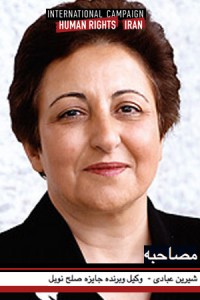Nobel Laureate Stresses the Plight of Imprisoned Teachers in Exclusive Interview

"The published list of imprisoned teachers is not a complete list, because, fearing persecution by the Intelligence Ministry, some families requested that their relatives’ names be excluded from the list," said Shirin Ebadi in an exclusive interview with the Campaign.
In an exclusive interview with the International Campaign for Human Rights in Iran, 2003 Nobel laureate and human rights activist Shirin Ebadi spoke about a new teachers’ rights initiative and called on the Iranian government to “listen to the legitimate demands of the teachers and to act on them.”
Be Voice of Iranian Teachers, a new initiative launched by Iranian teachers’ rights activists, human rights organizations and activists, journalists, teachers, and lawyers, including Shirin Ebadi, recently released a partial list of Iranian teachers who have been imprisoned or detained because of their participation in trade organizations or demonstrations.
International Campaign for Human Rights in Iran: What inspired you to launch Be Voice of Iranian Teachers?
Shirin Ebadi: This initiative is in fact a voice of Iranian teachers reflected at the international level. Due to their trade and union demands, Iranian teachers have been imprisoned, dismissed from their jobs, and the response to their legitimate requests has been government violence and unfair sentences. According to a list published after June 2009, dozens of teachers have experienced imprisonment, some of them still behind bars, serving long sentences, including individuals such as Mr. Abdollah Momeni, whose brother was a War Martyr and has a good teaching record.
ICHRI: How serious are the conditions of these teachers?
Ebadi: Unfortunately, among the imprisoned teachers on the list, three of them have been sentenced to death and face danger. This reminds us of Farzad Kamangar, a young teacher who was arrested four years ago and was executed in 2010, without a chance at a fair trial. The importance of this initiative is that it demonstrates public opinion at a national and international level, and shows that the regime’s opposition and critics are not only politicians, but also civil society.
ICHRI: Were the teachers listed political activists?
Ebadi: These teachers did not have political demands. As we can observe now, sometimes they gather for a couple of days a week in front of the Iranian Parliament, and express their demands for the trade rights they deserve. But after each gathering several of them are fired. This initiative is the voice of individuals whose voices are not heard by people due to censorship and repression
ICHRI: This initiative published a list of 39 detained or imprisoned teachers, as well as several more who have been summoned and interrogated by security forces. Does this list include all persecuted teachers in Iran?
Ebadi: The published list of imprisoned teachers is not a complete list, because, fearing persecution by the Intelligence Ministry, some families requested that their relatives’ names be excluded from the list. Therefore, the list only includes the names of those individuals who have decided to embrace problems with the Intelligence Ministry. This list demonstrates how the people who teach our future generation, who must build this country, are treated. The new school year has started and students ask themselves, “Where is the kind voice that taught us?”
In our religious lessons, to which Iranian statesmen claim they are committed, it is stated that teaching is the job of prophets. And we put our teachers in prison only because they have trade demands, or object to their low wages, or they have union-related demands.
ICHRI: What effect are these detentions having on the school year that just began?
Ebadi: I am sorry for the young generation whose teachers are taken to prison like this. I remind you that when one of the individuals on this list was taking a test in the class, intelligence forces raided his classroom, and before the shocked eyes of his students, they handcuffed the teacher and arrested him.
This means that the regime fears a teacher to the point that it can’t even wait for his class to end and for the kids to leave the classroom before they arrest the teacher. Where does the regime’s fear come from? I believe this fear by the regime is because they have no popular base, and everything, even a classroom, frightens them. A teacher who is popular with his students is a source of fear for the regime, because the regime fears that maybe 10-year-old students could rise against it and overthrow its rule!
ICHRI: If you could send a message to Iranian officials regarding these teachers, what would it be?
Ebadi: My message to the Iranian government is to listen to the legitimate demands of the teachers and to act on them. The response to the logical and legitimate demands of one of the most deprived layers of society cannot be imprisonment. You jeopardize the future by doing this. When our youth observe that their teachers are imprisoned for legitimate demands, what lesson can they learn from this unjust act of the regime, especially as the teachers in prison have been deprived from due process and some of them have been tortured? I would like to remind you of the torture Abdollah Momeni wrote about in his letter from prison, formally filing a grievance. Not only did they not review his grievance, he has been denied his right to furlough for a long time.






